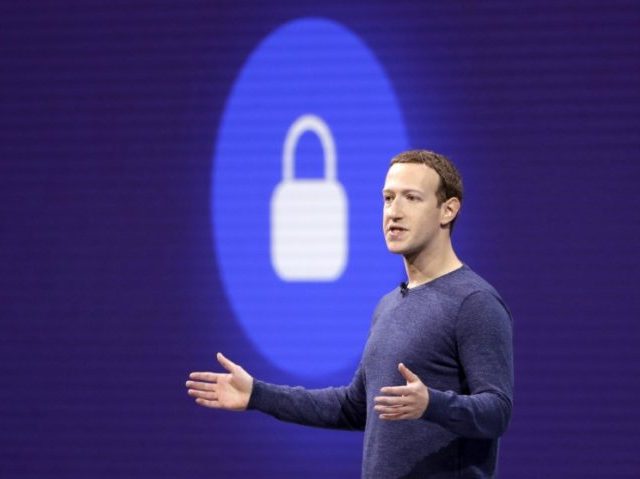Recently published internal Facebook documents reveal how the social media firm planned to charge advertisers and developers for access to user data.
As Breitbart News reported earlier today, the U.K. Parliament’s fake news inquiry has published a number of seized Facebook documents, which include emails between senior members of Facebook staff and other employees. The cache — which is approximately 250 pages long and was marked as “highly confidential” — was obtained from Six4Three, a startup app company that is suing Facebook.
One of the key takeaways from the documents so far has been Facebook’s efforts to monetize their users personal data, in one particular email it appears that the company has a minimum app-advertising spending fee for developers in order to continue accessing the personal data of Facebook users.
In an email from 2013 by Facebook’s director of platform partnerships Konstantinos Papamiltiadis, the executive suggests that if app developers don’t spend enough money, their access to Facebook will be revoked. In the emails, Facebook’s advertising program is referred to as NEKO, an internal acronym. The email reads:
Hello Ime,
I spent the best part of today thinking about the process as well as the requirements but the attached is still an early draft.
Still, I wanted to get your initial thoughts as I was planning to use those slides when I talk to DevOps and Allison tomorrow morning (at 11am if you want to join) about this.
Key points:
1/ Find out what other apps like Refresh are out there that we don’t want to share data with and figure out if they spend on NEKO * Communicate in one-go to all apps that don’t spend that those permission will be revoked * Communicate to the rest that they need to spend on NEKO at least $ 250K a year to maintain access to the data
2/ Review future submissions and reject/approve as per the requirements above
3/ Update our policies if need be
4/ Comms / PR plan if # of apps affected is significant
Just fyi, we will be at an EMEA offsite tomorrow — but will be online late in the afternoon.Thanks a lot,
kp
The discussion of these business practices is unsurprising given Facebook CEO Mark Zuckerberg’s own comments on selling access to user data. Internal emails reveal that Zuckerberg discussed selling access to user data, including information of users, to developers and advertisers on Facebook’s platform. Emails dating back to October 2012, shortly after Facebook’s IPO, show Zuckerberg brainstorming ways to generate revenue, including selling user data access directly to developers.
Zuckerberg wrote in his email:
I’ve been thinking about platform business model a lot this weekend…if we make it so devs can generate revenue for us in different ways, then it makes it more acceptable for us to charge them quite a bit more for using platform. The basic idea is that any other revenue you generate for us earns you a credit towards whatever fees you own us for using platform.
For most developers this would probably cover cost completely. So instead of every paying us directly, they’d just use our payments or ads products. A basic model could be:
Login with Facebook is always free
Pushing content to Facebook is always free
Reading anything, including friends, costs a lot of money. Perhaps on the order of
$0.10/user each year.For the money that you owe, you can cover it in any of the following ways:
Buys ads from us in neko or another system
Run our ads in your app or website (canvas apps already do this)
Use our payments
Sell your items in our Karma store.
Or if the revenue we get from those doesn’t add up to more that the fees you owe us, then you just pay us the fee directly.’
Zuckerberg has since defended his comments in the published internal emails, stating in a Facebook post:
“Of course, we don’t let everyone develop on our platform.” wrote the Facebook CEO. “…We blocked a lot of sketchy apps. We also didn’t allow developers to use our platform to replicate our functionality or grow their services virally in a way that creates little value for people on Facebook. We restricted a number of these apps, and for others we asked developers to provide easy ways for people to share their content outside of their apps and to Facebook if they wanted.”
In an official statement Facebook said:
“We built our developer platform years ago to pave the way for innovation in social apps and services. At that time we made the decision to restrict apps built on top of our platform that replicated our core functionality.”
“These kind of restrictions are common across the tech industry with different platforms having their own variant including YouTube, Twitter, Snap and Apple.”
“We regularly review our policies to ensure they are both protecting people’s data and enabling useful services to be built on our platform for the benefit of the Facebook community. As part of our ongoing review we have decided that we will remove this out-of-date policy so that our platform remains as open as possible. We think this is the right thing to do as platforms and technology develop and grow.”
Read Mark Zuckerberg’s full statement on the issue here.

COMMENTS
Please let us know if you're having issues with commenting.